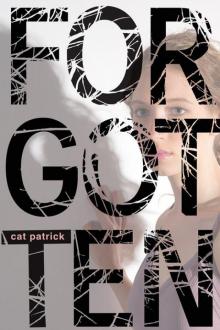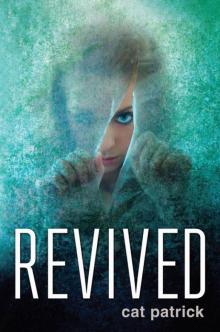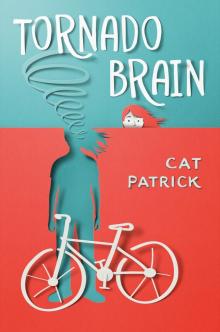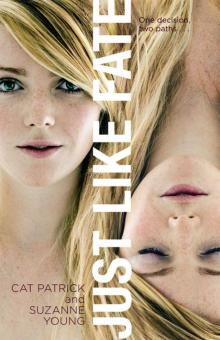- Home
- Cat Patrick
Tornado Brain Page 6
Tornado Brain Read online
Page 6
“Tess, please,” Mom said to my sister. She sounded desperate. Tears were rolling down my cheeks—I didn’t notice them until one dripped into my mouth. I didn’t like the warm, salty taste.
Tess stood up, scooted over, and dropped into the new chair with a thud, rewrapping her arms around herself and letting her hair fall over half of her face. She had tears in her eyes, too.
I wiped away my own and got into my chair as quickly as I could.
“Now that we’re all settled,” Officer Rollins said, “I’d like you to both see something we found in Colette’s locker.” He looked at Tess. “You share the locker with Colette?”
Tess nodded. “What is it?” she asked, sounding scared. It made me feel worse.
“It’s a diary,” Officer Rollins said.
I tilted my head to the side, picturing Colette taking some diary with a unicorn on the cover to middle school. “What the heck?” I asked, sniffing because the tears had made my nose run.
“Frankie!” Mom said. “Manners, please.”
“It’s okay,” Officer Rollins said to Mom. Then, looking at me, he said, “It’s interesting that you ask that, Frankie, because your name is on it.” I opened my eyes wide as he looked at my sister. “Yours too, Tess.”
I leaned forward so I could see Tess around Mom. She did the same, the chair incident forgotten. Everyone in my family is used to my emotions.
“He’s not talking about—” Tess started to say, but then stopped because she knew that I knew what she meant.
“No way,” I said back to her. “It’s in my room. In that place.”
“I thought so, but then . . .” Her voice trailed off.
“Right?” I said. “How . . .”
“Exactly. And when . . .”
“I know, and . . .” I scrunched up my forehead. “I don’t know.”
We both looked back at Officer Rollins, who had a confused expression on his face. He cleared his throat. “Okay, then,” he said. “I don’t know if it’s twin language or teen language, but either way, I’m definitely not fluent. Care to elaborate?”
“Huh?” I asked.
“Sorry,” Tess said. She apologizes too much. “There’s this notebook—”
“Could you speak up a little?” Officer Rollins asked. “I can barely hear you.”
“Sorry,” Tess said again, a bit louder. “There’s this notebook we had when we were younger. Way younger, like in third grade. We wrote in it until the end of elementary school.”
I talked over Tess. “None of us were ever in the same class in elementary school, so we wrote notes for each other and left them in a hiding spot in the library. We checked it when it was our class’s turn to have library time.”
“It was the way we stayed in touch.” Tess looked down at her hands, then back at Officer Rollins. “It can’t be what you’re talking about, though, because Frankie has that notebook at home. And Colette wouldn’t take it to school now.”
“Did you?” Officer Rollins asked.
“No!” Tess said, her neck red and blotchy.
Officer Rollins bent over and picked up a big puffy envelope near his feet. It was the same envelope I’d seen the woman officer carrying a little while ago. Officer Rollins dumped its contents onto the table. All that was inside was a book inside a plastic baggie. A book that a grown-up might call a diary. The book that Tess, Colette, and I had called—
“Fred!” Tess shouted. “She had Fred!”
Seeing the notebook that Colette had asked me for the night before—the notebook that should have been in my room—was so confusing. I just stared at it for a few seconds, trying to work out how she could have gotten it. Unless it hadn’t been in my room in the first place. But then, where had it been? Or unless she’d taken it from my room. But when? Besides eating dinner at the cottage, I hadn’t left my room at all.
“Its name is Fred,” Officer Rollins said, interrupting my thoughts. “I see.”
The reason the diary’s name was Fred was because I was a terrible speller when I was younger and I’d been trying to write friend on the cover, but I’d forgotten the i and the n. Thankfully, Tess didn’t tell Officer Rollins that humiliating fact about me; instead, she just said, “We liked the name and it was part of our code. Like we’d pass each other in the hallways and whisper, ‘Time to meet with Fred,’ and none of the other kids would know what we meant.”
“I see,” Officer Rollins said, removing Fred from the table and putting it back inside the puffy envelope. “This has to go to forensics; I just needed to make sure that the notebook belonged to Colette.”
“It belonged to me,” I said.
Tess shook her head and said softly, “It belonged to all of us.”
“Girls,” our mom said sharply, warning us not to fight.
“Sorry,” Tess said. I stayed quiet.
“It’s okay,” Officer Rollins said, smiling at Mom. “We made copies, so you can go through it at home and let us know if you see anything out of the ordinary.” He cleared his throat. “It’s a long shot, but we’re researching every possibility.”
“Can we leave?” I asked.
Mom gave me a look.
“In just a minute,” Officer Rollins said. “I wanted to ask both of you again: What time did you see Colette last night?” He crossed his arms over his chest and waited.
“Six forty-five,” I blurted out.
“What?” Tess asked defensively. “That’s when she was in my room. Why would she be in yours?”
“Like she can’t come to mine?” I asked back. “Like I have the plague or something?”
“That’s not what I meant!” Tess said. “I meant that she ca—”
“Girls!” Mom said again, more serious this time. “Keep your tones down.”
“Sorry, Mom,” Tess said.
“Yeah, sorry,” I mumbled.
I wasn’t sorry, though. I was right.
* * *
—
MOM LET TESS go off to help Mia make cookies for Colette’s parents and flyers to hang up around town, but she made me walk home with her. It was another example of how she treats me like I’m a little kid even though Tess and I are the same age.
She started to ask me questions about the conversation with Officer Rollins, about Fred, about seeing Colette the night before.
“We’re not talking about that stuff,” I cut her off.
“Then tell me why you seem so angry at your sister lately.”
She stole my only friend, I thought, but didn’t say, because I wasn’t sure if I completely believed it. If anyone had caused a change in our friendship status, it was Mia. But Tess had betrayed me, and I ended up friendless. So in a way Tess did steal my only friend—or friends, if you count a sister as a friend—or at least helped it happen. I wasn’t about to say all of that to my mom, though: she’d just defend Tess.
“I don’t know what you mean,” I said instead.
We were walking down Pacific in the opposite direction of the inn. I’d chosen the path, and Mom hadn’t said anything. She’d just started walking beside me, carrying my photocopy of Fred.
My hands itched.
“Okay . . . ,” Mom said, “then why were you rude to Kai at the station. Did he do something to you?”
That was an easy one. “No,” I said. “Kai is nice.”
“I thought so,” she said. “You two used to be such cute friends. Remember when you made up that language together at summer camp?”
I remembered getting laughed at by the other kids for making up my own language until Kai came over and asked if I would teach it to him, but I didn’t say that. I didn’t answer at all, and I think Mom understood that she was making me uncomfortable, so she got quiet and we walked in silence the rest of the way down Pacific.
My brain swirled and twisted. C
olette’s gone. Why won’t she just stop messing around and come back? I should be relaxing right now. Instead, I just left the police station! This is not how the day was supposed to go!
My head itched. I walked next to my mom, past the kite shop with the blue horizontal siding and the gift shop with the barn-red vertical siding. I scratched my head and counted my steps from one antique streetlight to the next: twenty-two. From that light to the next, I took bigger steps: eighteen. I scratched my head again, noticing that we were almost where I wanted to turn left, so I stepped out between parallel-parked cars to cross. My arm was practically torn from my body when my mom grabbed it and yanked me backward.
“Ouch!” I shouted, pulling myself from her grip as a car horn blared. I flipped around and saw my mom, wide-eyed. “That hurt!” I yelled at her.
“You were almost hit by a car!” she yelled back.
“I saw it!” I shouted, rubbing my sore arm where she’d grabbed it. “I was going to stop.”
“It didn’t look like it,” Mom said in a more normal voice. “Let’s go to the crosswalk.”
Between us, I hadn’t seen the car. But that’s not the type of thing you want to admit to your mom if you’re trying to stay off medication and out of therapy.
Also, the speed limit is only twenty-five, which is around how fast tornadoes go, so I probably wouldn’t have died. I read once that your chances of dying if you’re hit by a car going that slowly are only three percent or something. I’m not sure I have that right, though.
Safely across the street, we turned left at Bolstad toward the ocean. Mom didn’t say anything when we passed City Hall or the RV Resort; when we walked under the WORLD’S LONGEST BEACH sign and down the long row of beach parking spots.
“Can we take the boardwalk?” she asked. “I don’t want to get sand in these shoes.”
We were at the big red buoy in the center of the road, almost where the parking stops and the beach begins. You can either go forward out to the sand, turn left and walk the boardwalk, or turn back toward the town. Canada is to the right and Oregon is to the left, if you walk long enough.
I really like walking on the beach and normally would have suggested that my mom just take off her shoes if she didn’t want sand in them, but I was so unsettled about all the change, I agreed. And I was glad almost immediately because the hollow plunk that the boards made with each of our steps was a beat that calmed me. Walking next to my mom calmed me, too.
“Are you worried about Colette, Frankie?” Mom asked in her soft voice. The wind whistled as it blew in the grass and I could see at least a dozen kites flying over the sand.
“Of course,” I said quickly. “Who wouldn’t be?”
“I wasn’t asking about other people; I was asking about you,” she said. “I know the last couple of months have been difficult for you . . .”
“You mean since I lost the only friend I’ve ever had?”
“I think people’s perceptions of things are different,” Mom said kindly. “Sometimes people remember things in a negative way while others may remember the experience differently.”
“I guess,” I said, watching the beach grass ripple like waves; I wished I could run through it and let it tickle my palms. “I don’t know how anyone could see it differently, though. Colette made the choice not to be my friend.”
“Huh,” my mom said. “Is that how Colette would tell the story? That she chose not to be friends with you? Or would she say you got mad and told her you didn’t want to hang out with her anymore?”
“By talking about me behind my back, she made the choice,” I said. “It’s her fault, not mine.”
“Oh, Frankie, friendships aren’t about fault,” Mom said. “They’re about forgiveness.” She nudged my shoulder with hers; we were nearly the same height and had been since last summer. Tess was way taller. “And they’re tough, especially when people grow up and change. You kind of have to keep getting to know your friends all the time. Want to know what other type of relationship is like that?”
“What?” I asked, not minding the conversation.
“Parent-kid relationships,” she said. “You guys grow and change all the time and I have to keep trying to get to know the new you.”
“I’m the same me,” I said. “I haven’t changed. Colette has.” Had? “Mom?” I asked, looking up at her.
“Hmm?”
“What if Colette’s dead?”
“Oh, my girl,” Mom said, “I don’t even want you to think that way. Colette’s probably just fine.”
Her tone didn’t sound convincing.
“I am thinking that way, though,” I said. “Mom, seriously, what if she’s dead?”
Mom looked really sad. “I hope with all my heart that she isn’t, for Colette’s parents’ sake, for Tess’s and her other friends’ . . . and for yours.”
“Me too,” I said, because no matter what, that much was true.
chapter 7
Fact: Three types of tornado alerts are watch, warning, and emergency.
BACK AT HOME after the police station, I felt jumpy, like during a tornado watch. That’s when the weather conditions are right for tornadoes, but the weather people haven’t spotted any funnel clouds yet.
I kept looking out the window, like Colette was just going to stroll up to the inn with a big smile on her freckled lips. Pacing, with Pirate watching me from the foot of my bed without lifting her head, I asked Colette a string of questions aloud.
“Where are you . . . and why was Fred in your locker? How did you get Fred? And how the heck were you in my room and Tess’s at the same time? Why was Kai at the police station? . . . Oh, and what’s up with your weird boyfriend staring into space?”
Here’s a tip about me: I have to have answers. If you tell me a riddle and I can’t solve it fast, you just have to tell me the solution. And if you say you’ll give me a present later, you might as well give it to me now, because otherwise I’ll keep thinking about it like crazy until later comes. It’s all I’ll think about, not wanting to, like how you can’t stop touching a hangnail or licking a mouth sore even when it hurts.
So yeah, I have to have answers. The world seems less overwhelming that way.
That’s not the greatest way to be, though—at least not if you want to have a lot of friends. People don’t always feel comfortable if you just ask them things. That’s called “being direct” and most middle school kids I’d encountered so far didn’t like it.
Except Kai.
I pulled out my phone and sent him a text. It’d been a long time since we’d texted. The last one I’d sent him was a whole six months earlier.
FRANKIE
Hi
KAI
R U eating dessert in a tornado right now?!?
LOL. No. Wondering why you were at the ???
The dots did their dance for longer than I thought they should have, like Kai was really thinking about his answer. I was impatient.
WELL?
she was at the store
last night
I was wkng
????
How should I know
Taking video selfies and stuff
HUH
Of what
Not talking . . .
Just standing there like a statue and freakin out customers
?
Around 8
That’s what I told the cops
ur like them with the ???????
SNS
Sorry-not-sorry was basically my motto.
He sent a crying-laughing emoji with a wave.
One time, Gabe made me practice during one of our therapy sessions. That’s an example of how my life is not normal—adults make me practice texting. Gabe told me how to look for signs that people were ready to stop a conversation a
nd made me practice ending them. Because otherwise, I’d text people all night long. I mean, if I had anyone to text.
Bye Kai!
He sent another wave. I wanted to tell him that my previous text rhymed, but that would be continuing the conversation that Kai clearly wanted to end. So I put my phone on my nightstand.
It had been the longest, weirdest Friday ever. And still, dinner wouldn’t be for a few hours. I needed something to take my mind off how strange the day had been, so I got the photocopied pages from the police station and started looking through them.
Fred, our notebook or diary or whatever you want to call it, is about the size of a typical book, but the sheets of paper that Fred was copied onto were bigger, normal pieces of white printer paper. That meant that there was a fat margin between the edge of Fred and the edge of the copy paper—but whoever copied Fred had held him down flat through the process, so part of the person’s arm was visible in the margin.
I got distracted and grossed out by the photocopied hairs from the copier’s wrist appearing on every page. It took me a few minutes to get over that and start really reading.
When I did, I was embarrassed because stuff I’d thought was important as a third grader felt ridiculous now. The first few notes that Tess, Colette, and I left for each other in the library said things like:
Hi! How are you today?
Hi back! I’m fine how are you
It’s cold outside. I don’t want to go to recess!
Mr. Ellensburg is so mean!
I wish my mom would let me have a guinea pig!
Most of the messages from Colette and Tess didn’t really say much of anything. There were a lot of drawings of kids and tigers and rainbows and dolphins. My messages were more real. One from me to them said:

 The Originals
The Originals Forgotten
Forgotten Revived
Revived Tornado Brain
Tornado Brain Just Like Fate
Just Like Fate